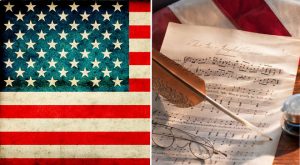Today on My Poetic Side we look at the winner of this year’s Pushcart Prize and the origins of The Star-Spangled Banner.
Poet Finally Gets the Prize
 Finally, after 30 years of nominations, Jo McDougall has won a Pushcart Prize.
Finally, after 30 years of nominations, Jo McDougall has won a Pushcart Prize.
The poet, who is 84, had heard rumours that she might have won but hadn’t been told through any official chancel, so rang Pushcart Press only to discover that this year she had won for her poem “Rivers”.
The pushcart Prize began in 1975 to honour the very best essays, poetry and short stories that are published in the US by small presses.
The winning poem “Rivers” is a short, inciteful look at the nature of rivers and offers readers a somewhat surprising twist at the end. It was originally published, together with three other poems by McDougall in the Arkansas Review: A Journal of Delta Studies in April 2019.
The winning poems will be published in Pushcart Prize XLV: Best of the Small Presses. This is an anthology published on an annual basis in November. There is no actually financial prize for the Pushcart however they received several thousands of nominations annually and only publish a small number of poems in the anthology, so it is quite prestigious.
McDougall began a four-year term as the Poet Laureate for Arkansas in May 2018. In total, she has six published collections of poetry. Her debut collection The Woman in the Next Booth and Dirt was published in 1987 and looks at the devastating aftermath of her sons’ stroke and the death of her daughter.
Should The Star-Spangled Banner Be Replaced?
 Following on from yesterdays article about BLM and the statues in the US that are under threat of being removed, we now look at The Star-Spangled Banner and the debate surrounding whether it should be replaced.
Following on from yesterdays article about BLM and the statues in the US that are under threat of being removed, we now look at The Star-Spangled Banner and the debate surrounding whether it should be replaced.
Written in 1814, the words were written by Francis Scott Key the American poet in The Defence of Fort McHenry. He had been inspired by the American victory over the British to write the words. It was put to the music of The Anacreontic Song, which was composed 40 years earlier by a British composer. Initially, the two were paired together as a drinking song but in 1931 they became the official national anthem of the US.
Born in 1779, Francis Scott Key was a lawyer, a poet and a slaveholder. He was raised in an old plantation family in Maryland and eventually took up the position as the US district attorney for Columbia. Whilst he was in this post, he was active in suppressing slavery abolitionists. Later, he did speak out regarding the cruelty of the slave trade however whilst he was in a position of power, he did nothing.
The words of the Star-Spangled Banner have often been referred to as hypocritical.
The big question is should the song in its entirety be replaced because of its origins, or should the US take a page out of Germany’s book and re-write the most problematic verse, verse 3. Tradition is, of course, no reason to keep the status quo.


You must register to comment. Log in or Register.